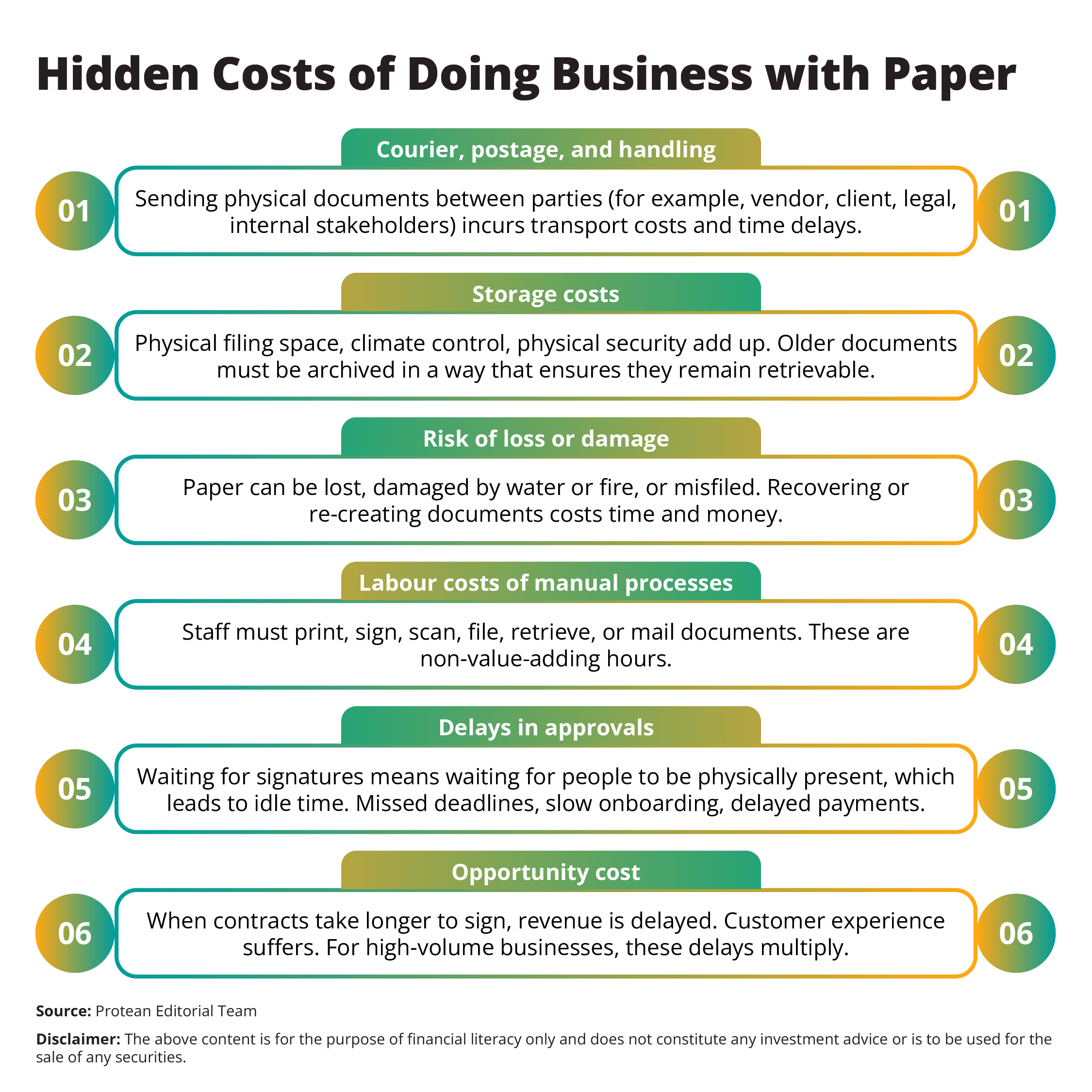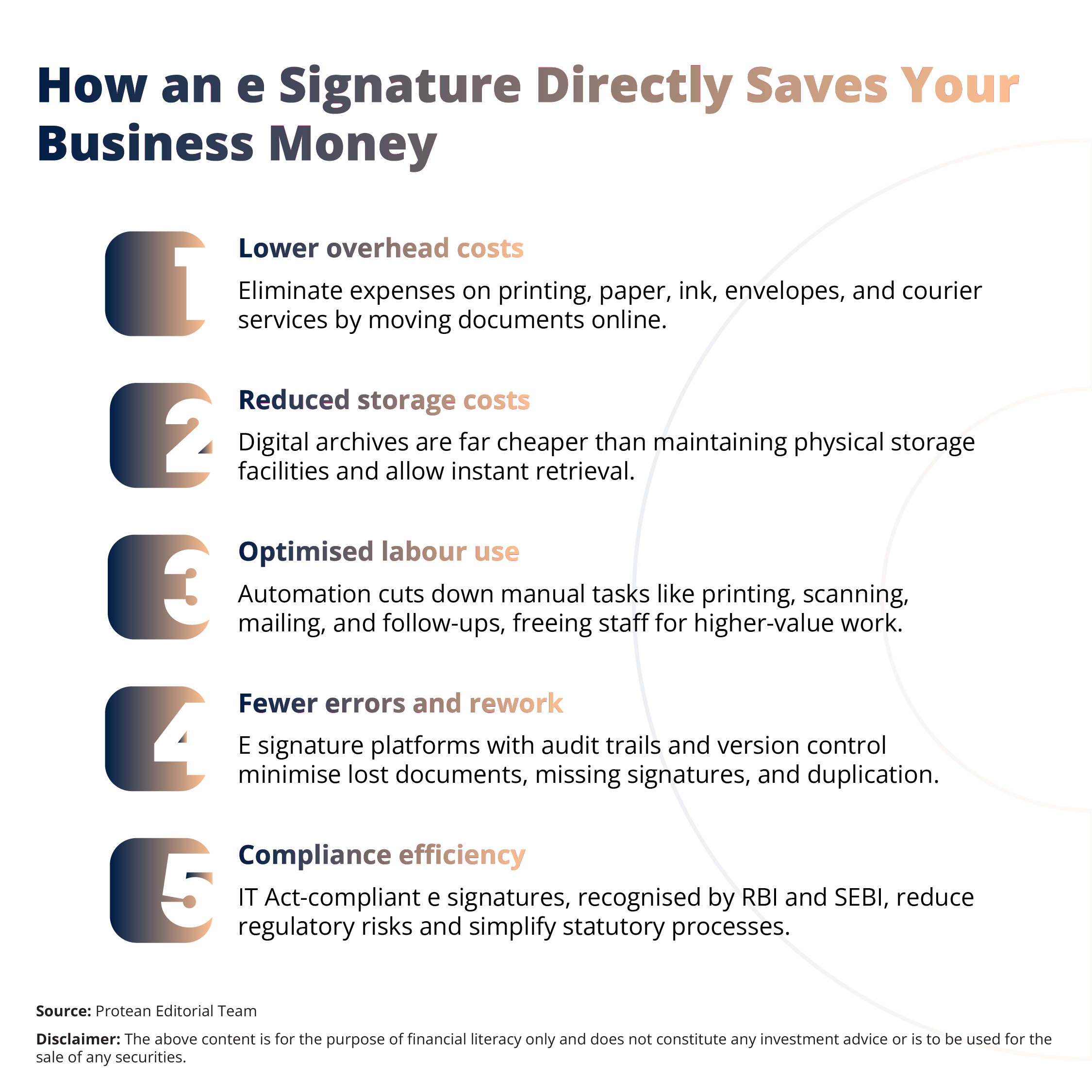An electronic signature (e signature) or online signature can help you save time. But can it also help you save the time and money of your business? Here’re the details of the role an online signature plays.
Every business (be it large or small), spends a lot of resources managing paper documents. They can have costs associated with:
- Printing contracts
- Postal or courier costs
- Storing physical files
- Managing manual approvals
In many cases, employees wait for signatures, scan documents, or travel between offices. Beyond direct cost, delays can reduce customer satisfaction and hurt competitive advantage.
In the growing digitised economy, the dependence on paper-based workflows is time consuming, expensive, and not much useful. Let us explore the electronic signature system as an alternative.
Hidden Costs of Doing Business with Paper
When a business relies heavily on paper signatures instead of electronic signature, hidden costs can emerge:

Recent regulatory developments for digitising the processes include:
- The RBI’s Guidelines on Digital Lending require digitally signed loan documents.
- Lenders must send documents like Key Fact Statements, sanction letters, terms and conditions etc., digitally signed and delivered via email or SMS.
- SEBI has issued informal guidance accepting e signatures for client acknowledgement in portfolio management contracts, reducing the need for handwritten signatures.
How an e Signature Directly Saves Your Business Money
Using e signature can deliver clear cost savings in various ways:
- Lower overhead costs: Eliminate expenses on printing, paper, ink, envelopes, and courier services by moving documents online.
- Reduced storage costs: Digital archives are far cheaper than maintaining physical storage facilities and allow instant retrieval.
- Optimised labour use: Automation cuts down manual tasks like printing, scanning, mailing, and follow-ups, freeing staff for higher-value work.
- Fewer errors and rework: E signature platforms with audit trails and version control minimise lost documents, missing signatures, and duplication.
- Compliance efficiency: IT Act-compliant e signatures, recognised by RBI and SEBI, reduce regulatory risks and simplify statutory processes.
Even small savings per contract can add up to lakhs annually while accelerating cash flows through faster approvals.

For instance, SEBI has launched a single-window digital platform for FPIs involving using digital signatures to replace physical document submission, speeding up onboarding and compliance. Also, the RBI digital lending guidelines mandate timely delivery of digitally signed document kits to customers.
Beyond Time and Money: The Added Benefits
An e signature can bring additional advantages such as the following:
- Improved security and auditability
- Better customer experience
- Scalability
- Environmental benefits
- Regulatory alignment and future readiness
Conclusion
Adopting electronic signatures can cut costs, speed up operations, and ensure compliance with RBI and SEBI requirements. For businesses managing contracts, agreements, or approvals, e signatures can:
- Reduce overheads
- Improve reliability
- Future-proof processes
| In today’s market, shifting from paper can be about staying competitive. Get in touch now for an effortless online signature suite. |
Frequently Asked Questions
- Is an electronic signature legally valid in India?
Yes. Under the IT Act, 2000, digital signatures and Aadhaar-based eSign are legally recognised, provided integrity and authenticity are maintained.
- Are there documents that cannot be signed electronically?
Yes. Certain documents still require physical signatures, such as wills, some power of attorney, negotiable instruments, and property registrations.
- What types of e signatures are acceptable?
Legally valid options include PKI-based digital signatures, Aadhaar-eSign (OTP/biometric), and DSCs from licensed Certifying Authorities.
- What regulatory requirements apply?
E signatures need to comply with the IT Act, ensure audit trails, verify identity, and secure storage. RBI and SEBI also mandate digitally signed documents in specific sectors.
- How should a business choose a solution?
Businesses can select a compliant, secure, and user-friendly platform that supports Aadhaar/DSC, provides audit trails, integrates with workflows, and offers strong support.

